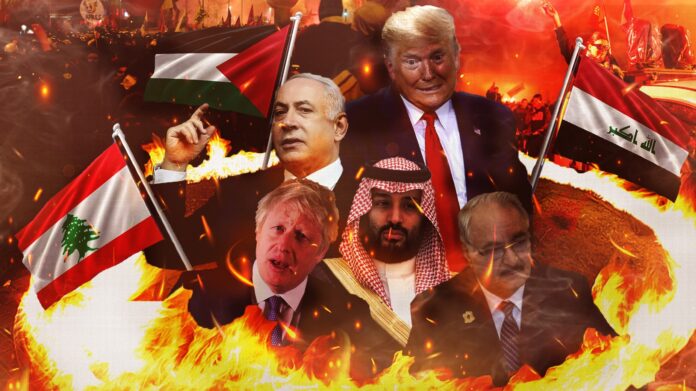Author: David Hearst
Affiliation: Middle East Eye
Organization/Publisher: Middle East Eye
Date/Place: December 2019, U.K.
Type of Literature: Analysis
Word Count: 3700
Link:https://www.middleeasteye.net/opinion/2020-middle-east-key-issues-to-watch
Keywords: The Middle East, Emerging Trends, Future Scenarios
Brief:
The article highlights local and global developments likely to dominate the Middle East in the year ahead. The article boldly claims that a new decade is dawning with record political heat, strong waves of discontent and demands for change raging throughout the region. The author argues that in 2020, the key developments for the Middle East will continue to be determined by the long time confrontations between what he calls the Arab NATO—consisting of the United States, Israel, Egypt, Saudi Arabia and the United Arab Emirates; and the Axis of resistance, namely the alliance of Iran, Syria, Hezbollah and pro-Iranian militias in Iraq and Yemen. The two camps are competing for the regional leadership. Russia, China and Turkey will exert their increasing influence from outside and affect the balance of power between these two camps in a practical manner. Three additional trends should be considered in such an established geopolitical framework. First, the presidential election in the United States, which might subject the US’s role in the Middle East to debate between Trump, who desires to limit it, and Washington’s foreign policy and defense establishment, which remains inclined to keep it up with endless wars in the region. Second, it remains to be seen whether, and how the ongoing protests in several Arab capitals will alter the balances of power in the region, especially Iranian influence. Third, the parliamentary elections in Iran, due to be held in February, could considerably limit President Hassan Rouhani’s room to manipulate in a possibly controlled de-escalation with the US. The rise and spread of rightwing White nationalism throughout Europe and the US and US President Donald Trump’s re-election will profoundly affect the Middle East. The Gulf is on a hair-trigger, military action in the Gulf is unpredictable, and Trump fancies his chances of turn-off impeachment into an electoral advantage and getting re-elected. The only thing that could promise a better future for Saudi Arabia is change in leadership. While the domestic sphere has been characterized by the contradiction of reform and repression, regionally, Saudi oil fields experienced two attacks that affected production, and failed reconciliation with Gulf neighbor Qatar. The crown prince has let down his own people, regional powers and the international community after a futile five-year military venture in Yemen, the murder of journalist Jamal Khashoggi in late 2018, and gliding the oil company Aramco in global markets. With the UK’s official exit from the European Union, the author asks whether British desires to cultivate relationships with the Gulf States and Israel will cause it to overlook the brutality of Arab regimes and the degradation of Palestinian rights or if it will stand for moral decency as proclaimed by its leader.
By: Jemal Muhamed, CIGA Research Associate




